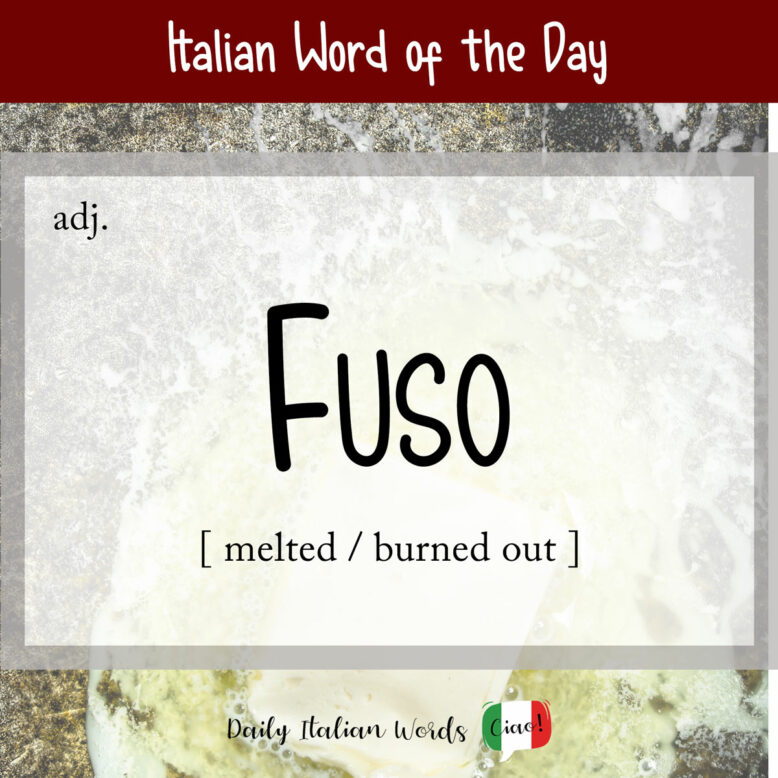The other day, I accidentally left a plastic jug on the hot stove, and as you can imagine, it melted onto the burner within minutes. Although cleaning up the mess was quite a hassle, it did inspire me to write about the adjective fuso, which translates to melted, molten or liquefied.
fuso
melted / molten / liquefied

Fuso is derived from the Latin fusum, which is the past participle of fundĕre meaning to melt. If you have trouble remembering the word, try associating it with fondue, a dish where food is dipped into a hot, melted sauce like cheese.
Being an adjective, it has masculine, feminine and plural forms:
- il burro fuso = the melted butter
- la colla fusa = the melted glue
- i formaggi fusi = the melted cheeses
- le plastiche fuse = the melted plastics
Mi piace versare il burro fuso sui popcorn.
I like pouring melted butter on my popcorn.
Related to fuso is the verb fondere (to melt / liquefy), which conjugates in the present tense in the following way:
- io fondo = I melt
- tu fondi = you melt (singular, informal)
- lui fonde = he melts
- lei fonde = she melts
- Lei fonde = you melt (singular, formal)
- noi fondiamo = we melt
- voi fondete = you melt (plural)
- loro fondono = they melt

Fuso can also be used figuratively to describe someone who is exhausted, worn out, or burned out. According to Devoto-Oli, this figurative use originates from automotive jargon, where the verb fondere is a synonym for grippare (to seize up).
Mamma mia, sono fuso! Devo andare a dormire presto stasera.
Phew, I’m exhausted. I need to go to bed early tonight.

In this article, we’ve focused on the usage of fuso as an adjective, but did you know that fuso can also be a noun? The noun, in its most basic form, refers to a spindle, a long, thin rod or stick that is used for spinning fibres into thread or yarn. It is from this meaning that we get the expression essere dritto come un fuso (literally “to be as straight as a spindle“).
The noun fuso also appears in the expression fuso orario, which means time zone in geographical terms. While the imported English term jet lag has been used in Italian since the 1980s, you can opt for expressions such as mal di fuso or sindrome / malessere da fuso orario instead.
Qual è il modo migliore per contrastare il mal di fuso?
What’s the best way to fight jet lag?
Fuso vs Sfuso
You might come across the word sfuso and think it means the same thing. Well, technically, sfuso can mean melted just like fuso, but this usage is not very common. Italians tend to use sfuso to refer to goods that are sold loose or unpackaged (e.g. delle caramelle sfuse = loose sweets).
Heather Broster is a graduate with honours in linguistics from the University of Western Ontario. She is an aspiring polyglot, proficient in English and Italian, as well as Japanese, Welsh, and French to varying degrees of fluency. Originally from Toronto, Heather has resided in various countries, notably Italy for a period of six years. Her primary focus lies in the fields of language acquisition, education, and bilingual instruction.


